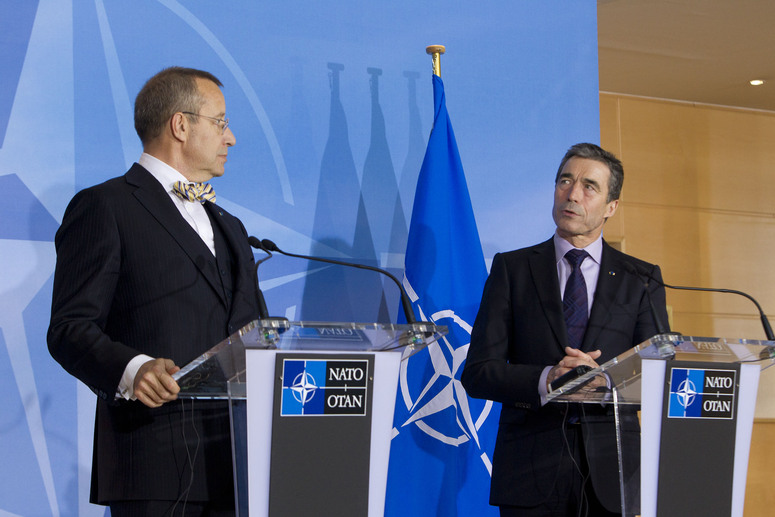Joint press conference
with NATO Secretary General Anders Fogh Rasmussen and the President of Estonia

OANA LUNGESCU (NATO Spokesperson): Ladies and Gentlemen, good afternoon, the Secretary General and the President of Estonia will make short statements.
ANDERS FOGH RASMUSSEN (NATO Secretary General): Good afternoon, I would like to welcome President Ilves. I very much value Estonia's commitment to NATO. And your country's contribution to the Alliance's objectives and missions. This afternoon, we've had a very good discussion on how to keep the momentum after our successful summit in Lisbon.
First, we discussed about keeping the momentum in Afghanistan. We are now entering a fundamental new phase into our engagement, a gradual transition to Afghan security lead. I'm grateful for Estonia's substantial contribution to our ISAF mission in Helmand, one of the most challenging provinces in Afghanistan. The efforts and sacrifice of the Estonia soldiers stand proof of Estonia's contribution to NATO solidarity and our shared security.
Secondly, we talked about the need to keep the momentum in implementing the decisions of the Lisbon and the NATO New Strategic Concept. We reinforced our commitment to collective defence. This remains the core task of our Alliance. And we must be ready and able to defend against any challenge which can threaten the fundamental security of individual allies or the Alliance as a whole. Continuing NATO air policing for the Baltic States is a visible proof of Allied commitment to collective defence.
At the same time, Estonia has and will continue to bring its own valuable contribution to the collective defence of the Alliance. Estonia has its own experience with cyber-attacks. The NATO Cyber Security Centre of Excellence in Estonia will play a key role in building up our collective defences in the 21st Century battlefront.
And thirdly, we have also discussed about keeping the momentum in relation with Russia. Bolstering NATO-Russia cooperation helps increase security for all in the Euro-Atlantic area and beyond. Obviously, NATO does not see eye to eye with Russia on everything. And we stick to our principles. But where we differ we have the mechanisms of the NATO-Russia Council to discuss mutual concerns.
And at the meeting in Lisbon, we identified our common security challenges. We agreed to boost cooperation on Afghanistan, the fight against terrorism and piracy and missile defence. We agreed that missile defence is an area of great potential for cooperation and to be clear we're not talking about creating one system. We're looking at linking up our capabilities NATO and Russia.
Significant work still lies ahead of us. But I'm convinced that we have a great opportunity to enhance through missile defence cooperation the strategic value of the NATO-Russia Partnership. Once again, Mister President, thank you very much for coming to NATO headquarters so shortly after Lisbon. I'm looking forward to continuing to work with you and your government to implement the decisions we took at the summit in Lisbon.
TOOMAS HENDRIK ILVES (President of Estonia): Well, thank you very much. It's always good to see the Secretary General, someone... we know each other for a long long time, even before your current position. And it is good to be back at NATO so quickly after the summit which as we discussed in our meeting, Estonia is very pleased with. We are very pleased with the results. The strategic concept is something that we all work very hard on. And we're glad to see that so many of our ideas were deemed to be good and that they were included in there.
On clearly the Strategic Concept is a core document that we'll be working from for quite a while. And it will be important that it'd be all encompassing and be high quality And we're very pleased with that. And in terms of the details, well clearly territorial defence, cyber security, these are issues which are close to our heart. And you can count on Estonia being an active participant in this area.
Other issues we discussed today also include the need to... to strive to reach or maintain a 2% GDP commitment to defence that we can take all... We can pass all the documents we want. But unless we have the real commitment which is shown in financial commitments, then they are... they're just a piece of paper. I mean, it's financial commitments show commitments to collective defence is the bottom-line I would say. And if you don't commit financially then there's always the danger of having free-riders. And we don't believe in that at all.
We're happy in the missile defence plans that we're accepting. I think they're a very good idea. And we will be working closely with all of our NATO to see that they're implemented in a way that increases the security of the whole region, not only NATO but also our friends in Russia. I think it's a very good, very solid step forward.
And in Afghanistan, as you mentioned, we are in Helmand. No caveats. They're in a very difficult position. I've just visited a month ago... Visited our troops there, very firmly committed to continuing and finishing the job there. And we're very proud of our men there. We're very proud of the job that NATO is doing there. And we call upon all of our allies to take very seriously the challenges that we face in Afghanistan with the understanding that if we don't meet the challenges in Afghanistan, we will be meeting the challenges here. And I think that it's better to meet them in Afghanistan than to see the success of terrorism in our own territories.
OANA LUNGESCU: Thank you very much and thank you to... to those who will be watching on the web. That concludes our press point this afternoon.
